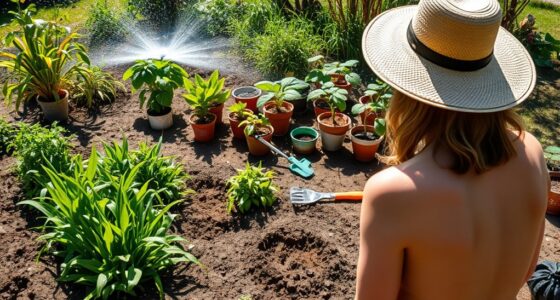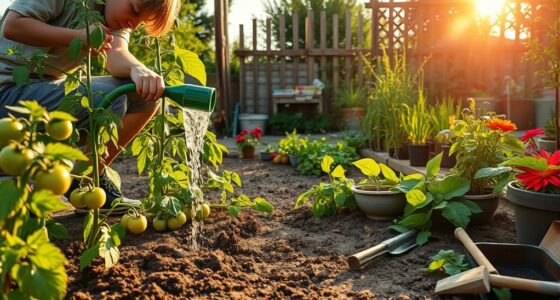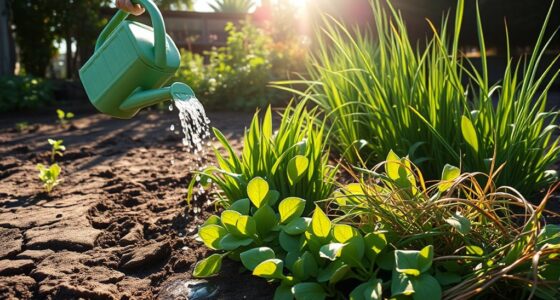As a beginner gardener, avoid common mistakes like neglecting soil assessments and not amending it with compost, which can hinder plant growth. Don’t wait until pests cause damage before acting on pest control, and make certain you introduce beneficial insects early. Be mindful of watering—avoid over- or underwatering—and give plants enough space for airflow and sunlight. By paying attention to these basics, you’ll set yourself up for a thriving garden; keep going to learn more tips.
Key Takeaways
- Assess soil quality and amend with compost before planting to ensure healthy plant growth.
- Implement proactive pest control strategies and inspect regularly to prevent severe infestations.
- Adjust watering based on plant needs and use mulch to retain moisture and prevent disease.
- Space plants appropriately to ensure proper airflow, sunlight, and nutrient access.
- Prioritize soil health, avoid overcrowding, and apply preventative measures for pests and diseases.

Starting a garden can be exciting, but beginners often make common mistakes that can hinder their success. One of the most critical errors is neglecting soil preparation before planting. Your soil is the foundation of a healthy garden, so you need to assess its current state carefully. Avoid rushing into planting without improving your soil’s health. Test its pH levels and nutrient content, then amend it with compost or organic matter to enhance fertility. Proper soil preparation ensures your plants have the nutrients they need to grow strong and productive. Skipping this step can lead to stunted growth and poor yields, no matter how much care you put into watering or pest control. Additionally, incorporating suitable soil types can significantly improve plant growth and overall garden health.
Another mistake beginners make is overlooking pest control from the start. Many tend to wait until pests are visibly damaging plants, but proactive measures are more effective and less stressful. Incorporate pest control strategies early on, such as introducing beneficial insects like ladybugs or using physical barriers like row covers. Keep your garden clean by removing dead leaves and debris, which can harbor pests. Regularly inspecting plants for signs of pests allows you to catch problems early, preventing infestations from getting out of control. Remember, healthy, well-maintained plants are naturally more resistant to pests, so don’t neglect the importance of consistent care.
You might also fall into the trap of overwatering or underwatering your plants. Both mistakes can weaken your plants and make them more susceptible to pests and diseases. Learn the specific water needs of your plants and adjust accordingly. Soil that is too wet can drown roots and promote fungal diseases, while dry soil stresses plants and hampers growth. Using mulch helps retain moisture and regulate soil temperature, reducing the risk of watering errors. Consistent, appropriate watering practices will keep your plants healthy and resilient against pests and environmental stresses.
Lastly, many beginners plant too densely, thinking more plants mean more harvest. This mistake limits airflow and increases humidity around your plants, creating ideal conditions for pests and diseases. Space your plants according to their mature size and provide enough room for air to circulate. Good airflow reduces humidity and discourages pest and disease problems, making your garden easier to manage. Proper spacing also ensures your plants receive adequate sunlight and nutrients, leading to healthier growth overall.
Frequently Asked Questions
How Often Should I Water My New Garden Plants?
You should water your new garden plants regularly to maintain a consistent watering schedule that promotes healthy plant hydration. Typically, aim to water deeply about once or twice a week, adjusting based on weather and soil conditions. Keep an eye on the soil moisture—if it feels dry a few inches down, it’s time to water. Proper watering guarantees your plants stay hydrated, grow strong, and resist stress.
What’S the Best Way to Improve Soil Quality Naturally?
To naturally improve your soil quality, start by incorporating soil amendments like organic compost and aged manure, which boost nutrients and structure. Practice composting techniques by recycling kitchen scraps and garden waste to create rich compost. Mix these amendments into your soil regularly, ensuring good aeration and drainage. This approach enhances soil fertility, supports healthy plant growth, and reduces the need for chemical fertilizers, making your garden more sustainable and productive.
Which Plants Are Easiest for Complete Beginners?
Imagine you’re starting your garden and want easy options. Succulent choices like aloe vera are perfect because they thrive with minimal care and tolerate neglect. Beginner-friendly shrubs such as boxwood or hydrangeas also flourish with basic watering and pruning. These plants are forgiving, require less fuss, and give you confidence as you learn. Focusing on these varieties helps you build a successful, low-maintenance garden from the start.
How Can I Prevent Pests Without Chemicals?
To prevent pests naturally, focus on natural pest control methods. You can attract beneficial insects like ladybugs and lacewings that eat pests, or use companion planting to deter troublemakers. Plant pest-repelling herbs like basil, marigolds, and garlic alongside your vegetables. Regularly inspect your plants and remove pests early. These organic strategies help protect your garden without chemicals, keeping it healthy and eco-friendly.
When Is the Ideal Time to Start Planting in My Area?
Think of your garden as a canvas waiting for the right brushstrokes; timing is everything. You should start planting after the last frost date in your area, which marks the beginning of seasonal planting. Check local frost dates to avoid an unexpected chill ruining your efforts. Typically, spring is ideal, but exact timing varies, so plan carefully to give your plants the best start and a thriving garden.
Conclusion
Don’t let beginners’ blunders derail your gardening dreams. Avoid these amateur mistakes, and you’ll nurture a lush, lovely landscape with less labor and more results. Remember, patience, planning, and persistence pave the path to perfect plants. So, stay savvy, steer clear of slip-ups, and savor the sweet success of your garden’s glow. With a little awareness and a lot of effort, you’ll grow into a gardening guru in no time!









